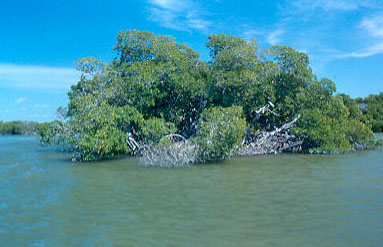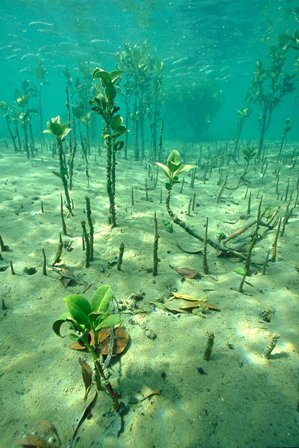Florida Mangroves a true treasure
Mangroves
are one of Florida's true natives. They thrive in salty environments
because they are able to obtain fresh water from saltwater. Some secrete
excess salt through their leaves, others block absorption of salt at
their roots. Florida's estimated 469,000 acres of mangrove forests
contribute to the overall health of the state's southern coastal zone.
This ecosystem traps and cycles various organic materials, chemical
elements, and important nutrients. Mangrove roots act not only as
physical traps but provide attachment surfaces for various marine
organisms. Many of these attached organisms filter water through their
bodies and, in turn, trap and cycle nutrients.
The relationship between mangroves and their associated marine life cannot be overemphasized. Mangroves provide protected nursery areas for fishes, crustaceans, and shellfish. They also provide food for a multitude of marine species such as snook, snapper, tarpon, jack, sheepshead, red drum, oyster, and shrimp. Florida's important recreational and commercial fisheries will drastically decline without healthy mangrove forests. Many animals find shelter either in the roots or branches of mangroves. Mangrove branches are rookeries, or nesting areas, for beautiful coastal birds such as brown pelicans and roseate spoonbills. Mangroves also filter water and maintain water quality and clarity.
The relationship between mangroves and their associated marine life cannot be overemphasized. Mangroves provide protected nursery areas for fishes, crustaceans, and shellfish. They also provide food for a multitude of marine species such as snook, snapper, tarpon, jack, sheepshead, red drum, oyster, and shrimp. Florida's important recreational and commercial fisheries will drastically decline without healthy mangrove forests. Many animals find shelter either in the roots or branches of mangroves. Mangrove branches are rookeries, or nesting areas, for beautiful coastal birds such as brown pelicans and roseate spoonbills. Mangroves also filter water and maintain water quality and clarity.



Comments
Post a Comment